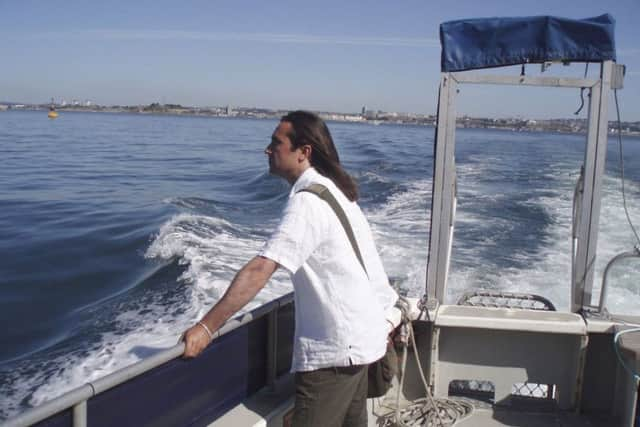John Mullin: Coasting to the TV remote


You know the score. You finally get the kids to bed – even, and you can scarcely credit this, the youngest, who’s left behind a devastated kitchen after discovering some secret, sticky recipe. Maybe, if you’re especially lucky, your missus or hubbie has decided to pack it in early doors, too.
True, you’ve then suffered a panic attack. But that has subsided when you’ve discovered the cheap plonk you presciently stashed for such emergencies. You pour yourself a hearty glass, remarking, as always, on that lovely glugging sound only a full bottle can make. Ah!
Advertisement
Hide AdAdvertisement
Hide AdYou, sir or madam, for maybe an hour or so, have the living room, and the TV remote, all to yourself, and nothing much to do except relax. Bliss. But what to watch?


We all have our guilty pleasures. Digital telly (the bog standard package, without exotic addition) can always offer up some oft-repeated brain rot in these late evening circumstances.
Whisper it, but I’ve always been partial to New Tricks – and there’s no escaping that on Dave, or Alibi, or Alibi+1.
But that has paled of late, as it’s increasingly easy to recite key scenes before Denis Waterman or James Bolam gets there.
One of the great joys of a previous working life when I had Mondays off was discovering ITV4. Work it right, and, as a bloke of a certain age, you could enjoy The Champions, The Saint and The Sweeney before, sated, dragging yourself off for a now not-so-early morning run. It was not all sloth, you know.
Thursday this week saw the return – and on proper terrestrial telly, too – of a particular favourite. And, as I sipped my Sauvignon Blanc, I found myself trying to work out what is the great alchemy of Coast, BBC 2’s most repeated programme. That means you can always find it on somewhere.
No-one could have predicted it would still be going so strong after it first aired in 2005. Even the programme makers clearly viewed it as a one-off as the series circumnavigated Britain clockwise over 13 episodes, with a quick detour to Northern Ireland.
There have been attempts to tweak the format since: themes preferred to geographical coherence; visits to others countries; Belgium, France and Norway among them; and the rather excitable Neil Oliver’s tour of Australia a couple of years back. And still, it steams on.
Advertisement
Hide AdAdvertisement
Hide AdOn one level, it is that we all love the seaside. I dimly recall that in the first series, presenter Nick Crane would end every episode by reminding the viewer that wherever you are in Britain, you are never more than 72 miles from the sea. I confess I did check that figure, for it is surprising.
It made me think of Ellen MacArthur, who celebrated her 39th birthday this week. She is from Matlock in Derbyshire, as far from the sea as it is possible to be in the UK, and yet she became a world-beating yachtswoman after saving all her dinner money to buy her first dinghy at 13.
So the sea of course looms large in our island story. But, for all of us, it is much more personal.
The programme evokes childhood holidays: of hefty paternal slaps in the street for running off as a four-year-old in Girvan; of cold showers and dropped towels at Benderloch; of a filthy caravan and fabulous chips in St Andrews; of weekend runs in the car – whenever whatever banger my father was driving lasted long enough to get there – to Aberdour, Largs and Oban.
Coast stirs Technicolor memories: of dad, long passed away; of mum, a non-smoker, lighting his fag as he drove, her face a picture of revulsion; of egg and sand sandwiches, crunchy delights; and of Orangeade with bits in, the consequence of the youngest family member’s inability to drink properly from the bottle. Guilty as charged.
And, for the emigre down south, when there’s a visit to Mull, or Lewis, or the Orkney Islands, Coast provokes a deep longing for home – and, shamefully, quite often a part of home you’ve never bothered to get around to visiting. Next time, is always the pledge.
Billy Connolly’s oft-repeated World Tour of Scotland used to perform the same trick, though it was more manipulative. Perhaps a tad overly fortified, I could barely watch Aberdeen, or Dundee, or even Greenock, for God’s sake, with a tear welling up.
But it is more than all of that: Coast is simply one of those programmes the BBC does so brilliantly. It is always beautifully shot, with exactly the right, subtle choice of background music, and the scripts are strong: interesting stories are ferreted out, and fascinating local characters explain them.
Advertisement
Hide AdAdvertisement
Hide AdThe presenters’ enthusiasm is key. When you watch someone like Crane – not exactly first choice to take down the pub for a pint – and he is so knowledgeable and engaged, it is infectious.
Episode one of series ten introduced us to scrofula, or tuberculosis of the lymph glands, rife among the poor of London, who were sent to Margate for sea therapy. They would sit in the freezing salt water to sluice their sores, though the provision of three meals a day and their enforced absence from the usual squalid living conditions no doubt were key to delivering the true health benefits. There was an unsolved detective story: ready, perhaps, for a New Tricks-style cold-case review: of a fearsome arson attack on the St Leonard’s home of MP Sir Arthur du Cros, an opponent of votes for women. The suspect, though never charged, was Kitty Marion, an actress, whose incarceration for other suffragette offences, meant she was – gorily – force fed in prison no fewer than 232 times.
And there was derring-do, thanks to Battle of Britain hero Neville Duke. His attempts in the Coronation year of 1953 to secure for the UK the air speed record in a new-fangled jet over the Sussex coast almost ended in tragedy when his Hawker Hunter virtually exploded. Six days later, he was back in the skies, and secured the record with a speed of 727.63 mph.
At the same time, you could have switched instead to Channel 4, and watched Married at First Sight, one of those reality TV programmes that sets the chattering classes, well, a-chattering. An expert panel selects a couple for marriage; they meet first time on the day they are going to walk down the aisle; and then we watch the aftermath. Reckon that will still be going strong in ten years?